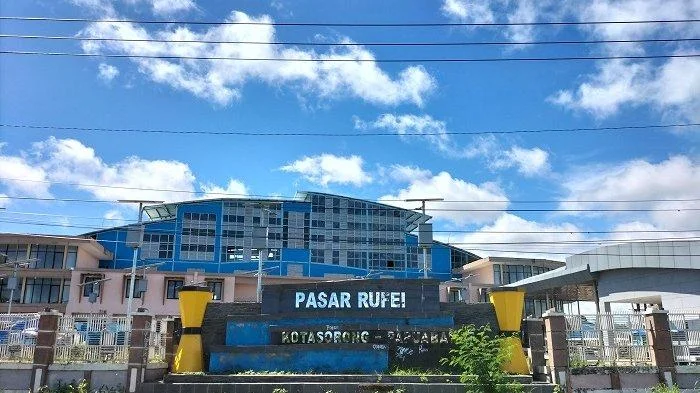Local Transmigration and Modern Markets Become Government Efforts to Realize Papua’s Economic Revitalization
By: Salmon Kadepa )*
The Indonesian government continues to demonstrate its commitment to strengthening the Papuan economy through an economic revitalization strategy that focuses on local transmigration and the development of modern markets.
The approach aims to empower local communities and create more equitable economic access in Bumi Cenderawasih. With great attention from the eighth President of the Republic of Indonesia, Prabowo Subianto, these policies are designed to ensure that existing development can improve the welfare of people at all levels, as well as strengthen the economic potential of the region.
Minister of Transmigration Muhammad Iftitah Sulaiman Suryanegara assessed that transmigration could function as an effort to revitalize the Papuan economy, but with an approach that is more relevant to local conditions.
Iftitah emphasized that transmigration in Papua does not always need to be in the form of moving from densely populated areas such as Java to the Papua region, but rather is more effective if implemented in the form of local transmigration.
According to him, residents who already live in one part of Papua can be moved to other areas in the region, according to certain considerations and development needs in the region. With local transmigration, Papuans can still live and work in their homeland, without the need for large-scale migration from outside the region.
Furthermore, Iftitah also revealed the Ministry of Transmigration’s plan to revitalize 10 existing transmigration areas in Papua. This step is expected to not only accelerate economic growth, but also ensure equitable development in the region nicknamed the Little Heaven that Fell to Earth.
President Prabowo, as the Head of State who understands the importance of developing Eastern Indonesia, emphasized the importance of developing local economic infrastructure and facilities that can support the local economy. This plan is in line with the government’s vision of creating inclusive and sustainable economic growth, which focuses on strengthening the welfare of the people in Papua.
In addition to the local transmigration program, the development of modern markets is another pillar in Papua’s economic revitalization strategy. Deputy Minister of Public Works Diana Kusumastuti informed that the Ministry of Public Works has completed the construction of Sanggeng Market in Manokwari Regency, West Papua.
The market is not only a trading facility, but is also designed with a modern concept that provides comfort for visitors and traders. With an aesthetic design and orderly environment, Sanggeng Market is expected to become an economic center that can meet the needs of the community while supporting the Micro, Small, and Medium Enterprises (MSMEs) sector.
Sanggeng Market stands on an area of 27,809 square meters with a three-story building covering an area of 21,519 square meters. With funds sourced from the State Budget worth Rp162.8 billion, this development is intended to support people’s economic activities in Manokwari, especially in ensuring the distribution of basic necessities and growing the MSME sector.
The development of the market is also projected to be one of the sources of regional income, which will strengthen the local economy and provide jobs for the surrounding community. The government hopes that Sanggeng Market can be an example of a modern market model that can function as a driving force for the economy at the local level.
The commitment of the eighth President of the Republic of Indonesia to accelerate economic growth can be seen from the ambitious target he wants to achieve under his leadership, namely economic growth of up to 8 percent.
One of the main strategies to achieve this target is through the development of the digital economy. In the digital era like today, the use of technology in the economic sector has proven to have a major impact in accelerating the rate of economic growth, especially in areas that have potential but are not yet optimally connected to economic centers.
CELIOS Digital Economy Director, Nailul Huda, said that the integration of digital technology in the economy can make economic activities more effective and productive.
Digital technology opens up great opportunities for UMKM players in Papua to develop their businesses without being constrained by geographical distance. With easy access to a wider market through technology, economic players in Papua can connect with consumers in various other regions in Indonesia. This is one of the concrete efforts to strengthen the economic foundation in Bumi Cenderawasih by utilizing existing digital innovations.
Revitalizing the Papuan economy through local transmigration, building modern markets, and digitalization are important steps in improving the welfare of people in the region.
The approach involving local transmigration not only brings Papuans closer to various economic facilities, but also allows them to remain in their homeland.
The development of modern markets such as Sanggeng Market provides decent trading facilities and supports the growth of MSMEs in the region, while the integration of digital technology provides new opportunities for business actors to develop in the digital economy era.
Through various strategic programs, the government aims to make Papua an economically independent, competitive, and prosperous region. The strong commitment of the nation’s leaders born in 1951 and the support of related ministries show serious efforts in creating a better and more competitive Papua.
With the support of all elements of society and the utilization of existing resources, Papua can develop into a region with a strong economy and provide prosperity for all levels of society in the region.
)* The author is a Papuan student living in Bandung
